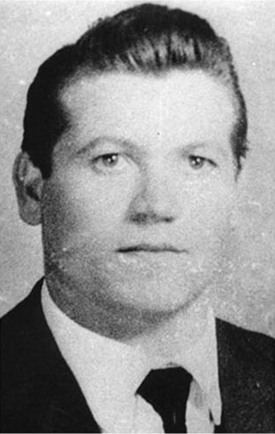
Bernardo Provenzano was an Italian mobster and chief of the Sicilian Mafia clan known as the Corleonesi, a Mafia faction that originated in the town of Corleone, and de facto the boss of bosses. His nickname was Binnu u tratturi because, in the words of one informant, "he mows people down". Another nickname was il ragioniere, due to his apparently subtle and low-key approach to running his crime empire, at least in contrast to some of his more violent predecessors.
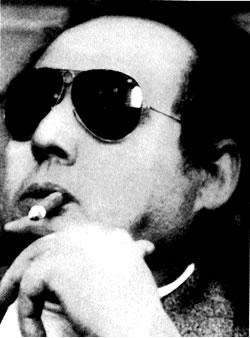
Luciano Leggio was an Italian criminal and leading figure of the Sicilian Mafia. He was the head of the Corleonesi, the Mafia faction that originated in the town of Corleone. He is universally known by the surname Liggio, a result of a misspelling in court documents in the 1960s.

Benedetto Spera is a member of the Sicilian Mafia and the boss of the Belmonte Mezzagno Mafia family and the mandamento of Misilmeri in the province of Palermo, Sicily, southern Italy. He was convicted in absentia for the killing of the two prominent anti-mafia judges Paolo Borsellino and Giovanni Falcone, receiving life sentences.

Leoluca Bagarella is an Italian criminal and member of the Sicilian Mafia. He is from the town of Corleone. Following Salvatore Riina's arrest in early 1993, Bagarella became the head of the stragist strategy faction, opposing another faction commanded by the successor designate Bernardo Provenzano, creating a real rift in Cosa Nostra. Bagarella was captured in 1995, having been a fugitive for four years, and sentenced to life imprisonment for Mafia association and multiple murders.
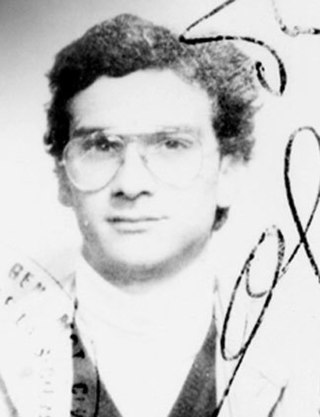
Matteo Messina Denaro, also known as Diabolik, was a Sicilian Mafia boss from Castelvetrano. He was considered to be one of the new leaders of the Sicilian mob after the arrests of Bernardo Provenzano on 11 April 2006 and Salvatore Lo Piccolo in November 2007. The son of a Mafia boss, Denaro became known nationally on 12 April 2001 when the magazine L'Espresso put him on the cover with the headline: Ecco il nuovo capo della Mafia.

Salvatore Lo Piccolo, also known as "the Baron", is a Sicilian mafioso and one of the most powerful bosses of Palermo, Sicily. Lo Piccolo rose through the ranks of the Palermo mafia throughout the 1980s and he became the capomandamento of the San Lorenzo district in 1993, replacing Salvatore Biondino, who was sent to prison. Lo Piccolo was a fugitive since 1983 and had been running his Mafia affairs in hiding. With the capture of Bernardo Provenzano on 11 April 2006, Lo Piccolo had been cementing his power and rise to the top of the Palermo Mafia until his own arrest on 5 November 2007. It is believed that his family spread across Europe due to rising tensions, settling in England, Portugal, and southern Spain.
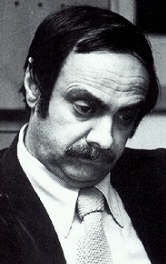
Giorgio Boris Giuliano was a police chief from Palermo, Sicily. He was the head of Palermo's Flying Squad. He was killed by the Sicilian Mafia while investigating heroin trafficking and money laundering. Not long before his death he had been one of the first Italian policemen to have attended the FBI academy at Quantico, Virginia. His son Alessandro became head of the Milan Flying Squad and arrested old guard Mafioso Gaetano Fidanzati in 2009; as part of the same operation, Gianni Nicchi was captured in Palermo.
The Sicilian Mafia Commission, known as Commissione or Cupola, is a body of leading Sicilian Mafia members who decide on important questions concerning the actions of, and settling disputes within the Sicilian Mafia or Cosa Nostra. It is composed of representatives of a mandamento who are called capo mandamento or rappresentante. The Commission is not a central government of the Mafia, but a representative mechanism for consultation of independent Mafia families who decide by consensus. Its primary role is to keep the use of violence among families within limits tolerable to the public and political authorities.

Michele Cavataio, also known as Il cobra was an Italian mobster and powerful member of the Sicilian Mafia. He was the boss of the Acquasanta mandamento in Palermo and was a member of the first Sicilian Mafia Commission. Some sources spell his surname as Cavatajo.

The Corleonesi Mafia clan was a faction within the Corleone family of the Sicilian Mafia, formed in the 1970s. Notable leaders included Luciano Leggio, Salvatore Riina, Bernardo Provenzano, and Leoluca Bagarella.
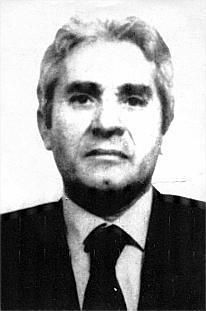
Antonino Geraci, better known as Nenè or il vecchio, was the historical boss of the Mafia in Partinico, in the Metropolitan City of Palermo. Geraci sat on the Sicilian Mafia Commission since the mid-1970s and belonged to the hard line faction allied with the Corleonesi of Totò Riina and Bernardo Provenzano. According to the pentito Tommaso Buscetta, Geraci took care of the fugitive Riina while he stayed in Partinico.

Renato Maria Giuseppe Schifani is an Italian politician who has served as the president of Sicily since 13 October 2022. Schifani was Silvio Berlusconi's chief whip and was a prominent member of the Senate of the Republic from 1996 to 2022. From 29 April 2008 to 14 March 2013, he was the president of the Senate of the Republic.
Calogero Bagarella was an Italian criminal and member of the Sicilian Mafia. He was from the town of Corleone and belonged to the Mafia clan of Corleonesi.

The Viale Lazio massacre on 10 December 1969 was a settling of accounts in the Sicilian Mafia. Mafia boss Michele Cavataio and three men were killed in the Viale Lazio in Palermo, Sicily, by a Mafia hit squad. The bloodbath marked the end of a pax mafiosa that had reigned since the Ciaculli massacre until the end of the Trial of the 114 against Cosa Nostra.

Salvatore Riina, called Totò, was an Italian mobster and chief of the Sicilian Mafia, known for a ruthless murder campaign that reached a peak in the early 1990s with the assassinations of Antimafia Commission prosecutors Giovanni Falcone and Paolo Borsellino, resulting in widespread public outcry and a major crackdown by the authorities. He was also known by the nicknames la belva and il capo dei capi.
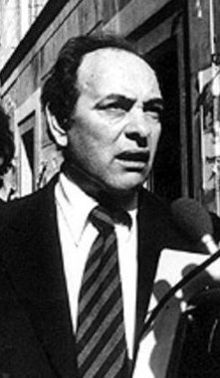
Mario Francese was an Italian crime reporter of the Giornale di Sicilia. He was the first journalist to expose the role of Toto Riina and the Corleonesi within the Sicilian Mafia, and because of this he was killed on 26 January 1979. After 22 years, in 2001, those who had decided to eliminate him were convicted.
Massimo Carminati, referred by the press as one of "the kings of Rome", in the context of the onset of the "Mafia Capitale" investigations among 3 other bosses, nicknamed as "il Cecato", is an Italian underworld figure and former member of far-right terrorist group Nuclei Armati Rivoluzionari and criminal gang Banda della Magliana, which were at the centre of sensational allegations of state collusion and Masonic conspiracy during Italy's Years of Lead. Carminati was investigated for match fixing in 2012. In 2014 he was arrested with 36 others on allegations of running a corrupt network that infiltrated Rome's public administration. He was charged with fraud, money laundering, embezzlement, and the bribing of public officials. In 2017, Carminati was sentenced to 20 years in jail. The sentence was revoked in 2018 and he is free since 2020.
The Ciaculli massacre on 30 June 1963 was caused by a car bomb that exploded in Ciaculli, an outlying suburb of Palermo, killing seven police and military officers sent to defuse it after an anonymous phone call. The bomb was intended for Salvatore "Ciaschiteddu" Greco, head of the Sicilian Mafia Commission and the boss of the Ciaculli Mafia family. Mafia boss Pietro Torretta was considered to be the man behind the bomb attack.

The Circonvallazione massacre, in Italian Strage della Circonvallazione, is a Cosa Nostra attack that took place on June 16, 1982 on the Palermo ring road. The attack was directed against Catanese boss Alfio Ferlito, who was transferred from Enna to the Trapani jail, and died with the three escort carabinieri and the 22-year-old Giuseppe Di Lavore, the driver of the private company that had the transportation of prisoners, who had replaced his father. The mandators of this massacre were Salvatore Riina and Bernardo Provenzano, in favor to Nitto Santapaola, who was in a year-long war with Ferlito for the predominance on the city of Catania territory.
The Graviano family is a Sicilian Mafia clan, composed of four mafioso siblings: Benedetto, Filippo, Giuseppe and Nunzia. Their father was Michele Graviano, uomo d'onore that belonged to the Brancaccio Mafia family and was murdered by Gaetano Grado in 1982.














